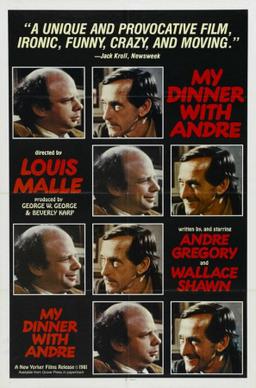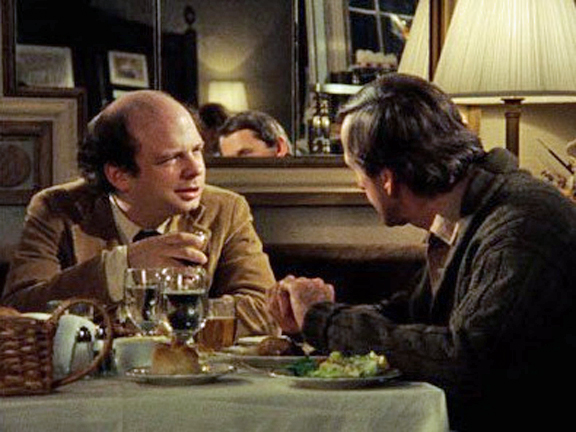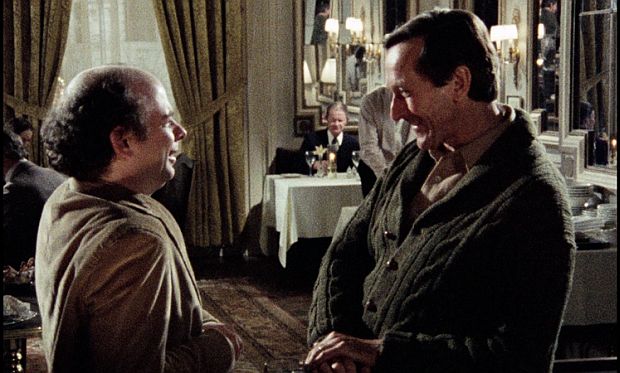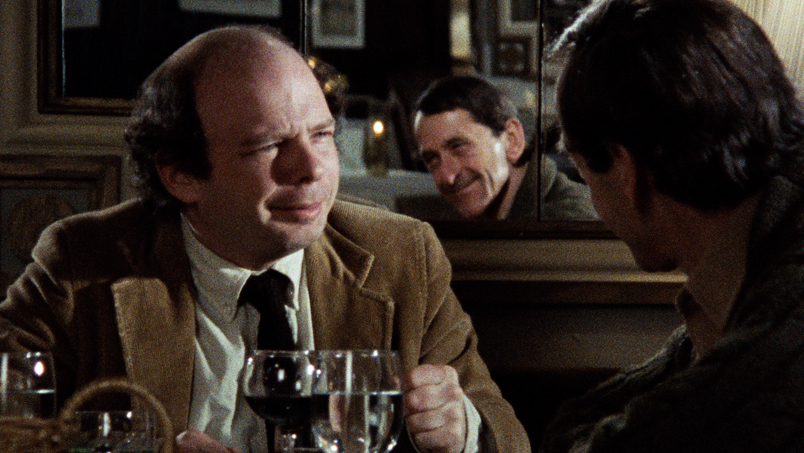I have a special relationship with Louis Malle’s 1981 Hollywood cum arthouse film My Dinner  with Andre. Although normally such a declaration would be followed by a revelation about how I was related to one of the actors, perhaps Wallace Shawn who plays an inoffensive man leading a mundane life, that is not the case. I was introduced to the film in a way that highlighted an aspect of interpretation, and although I didn’t know it at the time, I inadvertently learned firsthand about how little we understand ourselves.
with Andre. Although normally such a declaration would be followed by a revelation about how I was related to one of the actors, perhaps Wallace Shawn who plays an inoffensive man leading a mundane life, that is not the case. I was introduced to the film in a way that highlighted an aspect of interpretation, and although I didn’t know it at the time, I inadvertently learned firsthand about how little we understand ourselves.
I was visiting my oldest brother over thirty years ago when he mentioned that he’d seen the movie. “It was great,” he told me. “The whole movie takes place in a restaurant where two men are having dinner.” That turned out to be the only accurate thing my brother said about the film.
He continued, “And this one guy, who is just an ordinary guy trying to live his life, is meeting  with this pompous bore of a man who goes on about philosophical bullshit and nonsense and how special he is and how he travels all over. So full of shit. And the other guy sits there and listens patiently even though he can’t stand it, and then finally, right near the end of the film, the little guy just devastates him with just a few words. Really puts him in his place and shows him how full of shit he is. Amazing.”
with this pompous bore of a man who goes on about philosophical bullshit and nonsense and how special he is and how he travels all over. So full of shit. And the other guy sits there and listens patiently even though he can’t stand it, and then finally, right near the end of the film, the little guy just devastates him with just a few words. Really puts him in his place and shows him how full of shit he is. Amazing.”
I had never seen the film so I had nothing to say about his description, although my brother’s derision for the traveller and his sympathy for the normal man who had to sit through a pretentious diatribe stood out.  When I left my brother’s place that evening, the description stayed with me. Despite his positioning of himself as a stolid family man and his jealousy of my seemingly footloose university student lifestyle, I never thought he might be talking about himself. If I had thought to it, I might have considered that he was trying to make a statement by his way of talking about the film. Instead, if I thought of it at all, I presumed the film would be as he described and that its plot would be pointed toward the comeuppance of the windbag.
When I left my brother’s place that evening, the description stayed with me. Despite his positioning of himself as a stolid family man and his jealousy of my seemingly footloose university student lifestyle, I never thought he might be talking about himself. If I had thought to it, I might have considered that he was trying to make a statement by his way of talking about the film. Instead, if I thought of it at all, I presumed the film would be as he described and that its plot would be pointed toward the comeuppance of the windbag.
If you know the film, or have read a description of it online, you know that my brother’s description could not be further from the truth. As my first year sociology professor, Dr. Pepperdene once said in class, “it is not so much whether someone is right, but their mistakes can be very interesting.” My brother’s gross simplification of what the film was doing, as well as the roles of the characters, said much more about himself and his way of thinking about the world than it did the film which happened to fall victim to his fantastical reading.
When I watched the film with some friends a few years later, I waited for the subtle derision that would indicate that Wallace Shawn had enough of his friend Andre Gregory’s bombast. Likewise I waited for the empty philosophical platitudes which would best describe Andre’s character. Instead, I saw a film in which two very unalike friends meet, and through a long discussion conducted with mutual respect and delight, they both come to a better understanding of their own world and that of their friend. Far from Wally’s delight in the schadenfreude-fueled insult, or my brother’s description of Wally’s satisfaction at denigrating his friend, I saw instead a pleasantly  distracted man who takes the train back to his apartment and wife while pondering his childhood and the many different paths his life might have taken.
distracted man who takes the train back to his apartment and wife while pondering his childhood and the many different paths his life might have taken.
Once I saw the film, waiting all the while for the penultimate scene in which Wally destroys his erstwhile opponent, it gradually dawned on me that my brother not only missed the point of the film, but also saw an entirely different film of his own creation. Seeing in Wally’s character aspects of his own life, and in Andre’s character those people who he imagined to secretly despise him, he saw a film in which he had the final word.
My brother, like many of us in the family, had a poor start in life, and perhaps that drove him to choose the safe path when he was tempted by the impetuousness of Andre’s life. Confined by his own fear and conformist urge to exhibit success, he became more driven by money and status than trips down the Amazon River would have allowed.  Instead, he bragged about his house, about the pay from his job, and even though he was usually broke, he thought of himself as the success of the family. Importantly, that success was measured by what others in the family did not have. If someone was travelling then that affront to his staid nature defined the other person, and if someone were poor, that confirmed his wealth.
Instead, he bragged about his house, about the pay from his job, and even though he was usually broke, he thought of himself as the success of the family. Importantly, that success was measured by what others in the family did not have. If someone was travelling then that affront to his staid nature defined the other person, and if someone were poor, that confirmed his wealth.
His hatred of the Andre figure in the film is easier to see if we remember that he so thoroughly identified with only a few aspects of Wally’s life. The simple conformist life loomed much larger in my brother’s mind than the middle aged man’s reflection on his childhood, than his rapt attention while his friend told of his adventures, and he could see nothing of the relationship the two shared, despite their differences in personality. He saw perhaps ten percent of the film that he claimed to love, and that ten percent, since it was all about him and not about the film, was wonderful. He looked into the mirror of the filmic self and found himself grimacing in dismay about the world around him, and that affirmed every lack he saw in other people which he used to build up himself.
I think there is a lesson to us all here. We continually go through life looking for the narrative we expect and that blinds us to the narrative that is there. Car accident witnesses, caught in the heat of the emotive moment, see a dozen different things from a dozen different angles. They have as many stories about the cause as they have eyes, and they will even argue in the face of dash camera videos.
My brother managed to ignore  Wally’s obvious delight in Andre’s stories, their shared interest in philosophical questions, and the close bonding the two share. In order to get his fantasy of their mutual discord, my brother focused on their discussion about how possible Andre’s life was for ordinary people. He chose to ignore Wally’s re-examination of his life on the way home from the restaurant, and the film’s lack of resolution just to he could justify the normal man—and Wally is anything but—sticking it to the egghead intellectual. His need for an ugliness in the film drowned out its beauty, and he merely told a story about his own insecurities and jealousies, his willingness to ignore evidence to further emotional goals, and how he really felt about his life.
Wally’s obvious delight in Andre’s stories, their shared interest in philosophical questions, and the close bonding the two share. In order to get his fantasy of their mutual discord, my brother focused on their discussion about how possible Andre’s life was for ordinary people. He chose to ignore Wally’s re-examination of his life on the way home from the restaurant, and the film’s lack of resolution just to he could justify the normal man—and Wally is anything but—sticking it to the egghead intellectual. His need for an ugliness in the film drowned out its beauty, and he merely told a story about his own insecurities and jealousies, his willingness to ignore evidence to further emotional goals, and how he really felt about his life.
I think he would have been happier along the Amazon River, at least for a little while, and then when he watched the film he could have told himself the story about how Andre subtly undermines Wally’s pathetic life. He could have twisted the story to suit his new version of himself, although both versions reflect the same face.
My brother’s protest to the contrary, My Dinner with Andre is a wonderfully captured film about two men who exchange ideas and appreciation, and who both leave the dinner enriched by the experience.
